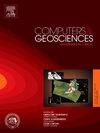OpenMP动态调度的自动调谐应用于全波形反演
IF 4.4
2区 地球科学
Q1 COMPUTER SCIENCE, INTERDISCIPLINARY APPLICATIONS
引用次数: 0
摘要
全波形反演(Full波形Inversion, FWI)是一种广泛应用于地震资料处理的方法,它能够估计出代表地下地质层特征的模型。由于该方法需要处理大量的数据,因此执行该方法需要大量的时间和计算资源,并且仅限于超级计算机等大型计算机系统。诸如FWI之类的技术非常适合并行计算,并且可以使用应用程序编程接口(API) OpenMP在共享内存系统中并行化。并行任务的管理可以通过OpenMP中包含的循环调度器来执行。动态调度器在运行时将预定义的固定大小的块大小分配给空闲的处理内核方面表现突出。它可以更好地适应数据处理不规范的FWI。但是,块大小和运行时之间的关系是未知的。优化技术可以使用元启发式来探索参数搜索空间,避免测试所有可能的解决方案。在这里,我们提出了一种策略,使用参数自动调整共享内存算法(PATSMA),以耦合模拟退火(CSA)作为其优化方法,自动调整块大小,以动态调度波传播,这是FWI中最昂贵的步骤之一。由于在完整的FWI中测试每个候选块大小是不切实际的,因此我们的方法包括运行PATSMA,其目标函数是第一次FWI迭代的第一次地震射击的第一次迭代的运行时间。得到的数据块大小随后被用于FWI中涉及的所有波传播。我们进行了测试,使用建议的自动调优来测量FWI的运行时间,改变问题大小并在不同的计算环境(如超级计算机和云计算实例)上运行。结果表明,与标准OpenMP调度器相比,在FWI中应用所提出的自动调优可以减少高达70.46%的运行时间。本文章由计算机程序翻译,如有差异,请以英文原文为准。
Auto-Tuning for OpenMP Dynamic Scheduling applied to Full Waveform Inversion
Full Waveform Inversion (FWI) is a widely used method in seismic data processing, capable of estimating models that represent the characteristics of the geological layers of the subsurface. Because it works with a massive amount of data, the execution of this method requires much time and computational resources, being restricted to large-scale computer systems such as supercomputers. Techniques such as FWI adapt well to parallel computing and can be parallelized in shared memory systems using the application programming interface (API) OpenMP. The management of parallel tasks can be performed through loop schedulers contained in OpenMP. The dynamic scheduler stands out for distributing predefined fixed-size chunk sizes to idle processing cores at runtime. It can better adapt to FWI, where data processing can be irregular. However, the relationship between the size of the chunk size and the runtime is unknown. Optimization techniques can employ meta-heuristics to explore the parameter search space, avoiding testing all possible solutions. Here, we propose a strategy to use the Parameter Auto-Tuning for Shared Memory Algorithms (PATSMA), with Coupled Simulated Annealing (CSA) as its optimization method, to automatically adjust the chunk size for the dynamic scheduling of wave propagation, one of the most expensive steps in FWI. Since testing each candidate chunk size in the complete FWI is unpractical, our approach consists of running a PATSMA where the objective function is the runtime of the first time iteration of the first seismic shot of the first FWI iteration. The resulting chunk size is then employed in all wave propagations involved in an FWI. We conducted tests to measure the runtime of an FWI using the proposed auto-tuning, varying the problem size and running on different computational environments, such as supercomputers and cloud computing instances. The results show that applying the proposed auto-tuning in an FWI reduces its runtime by up to 70.46% compared to standard OpenMP schedulers.
求助全文
通过发布文献求助,成功后即可免费获取论文全文。
去求助
来源期刊

Computers & Geosciences
地学-地球科学综合
CiteScore
9.30
自引率
6.80%
发文量
164
审稿时长
3.4 months
期刊介绍:
Computers & Geosciences publishes high impact, original research at the interface between Computer Sciences and Geosciences. Publications should apply modern computer science paradigms, whether computational or informatics-based, to address problems in the geosciences.
 求助内容:
求助内容: 应助结果提醒方式:
应助结果提醒方式:


